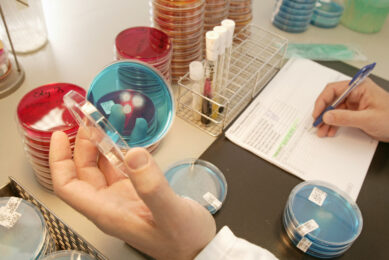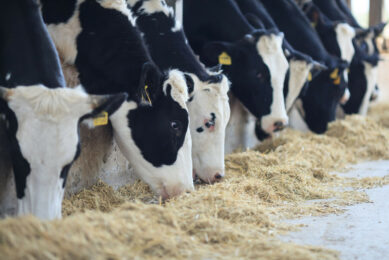Debate about resistant germs confuses consumers
Reports of antibiotic resistant bacteria in meat fuel the fears of consumers, but hospitals are still the main problem, writes the German Die Zeit newspaper online.
Apparently animals in German farms get to many antibiotics. Actually, their use is only allowed in case of diseases. But too often farmers use antibiotics also preventative – or to increase profits because antibiotics also foster the growth of the animals, Die Zeit writes.
Recently, a study by the Consumer Protection Ministry in North Rhine-Westphalia revealed that 96% of chicken flocks are treated with antibiotics. More than 180 companies were analyzed by the agency.
The inquiry led to the conclusion that farmers – despite the ban – also used bacteria-fighting substances in healthy animals, Die Zeit said.
Now the Federal Consumer Protection Minister Ilse Aigner wants to reduce the use of antibiotics in poultry farming and she has announced a new bill.
The announcement was accompanied by an analysis of the Society for Environment and Nature Conservation (BUND). This group had found antibiotic resistant germs in 11 of the 20 surveyed chicken products. For non-representative study products were obtained from shops in Berlin, Hamburg, Cologne, Nuremberg and Stuttgart region.
The use of antibiotics in intensive farming promotes the emergence of resistant bacteria. And that can lead to dangerous infections in humans – especially in hospitalized patients whose immune systems are already weakened.
Therefore the Federal Institute for Risk Assessment (BfR), urges the moderate use of antibiotics in animal farms.
That people may take in relevant amounts of antibiotics through consumption of meat is unlikely. In Germany, no food may be sold, containing such residues.
However, in the debate on antibiotic-resistant bacteria many aspects get mixed up and this confuses the consumer and causes unnecessary fears. Die Zeit therefore gives a clear overview of the key facts on antibiotic resistance:
Wrong and too frequent antibiotic therapy of patients
The most risky and resistant germs for humans come from hospitals, not from intensive farms. These are bacterial strains that have been genetically altered so that they can no longer be harmed by common antibiotics.
In hospitals, particularly in intensive care units, many pathogens float around that come into contact with different antibiotics again and again. In this environment, the bacteria can mutate and can multiply with ease. The constant contact with their "enemies" provokes the rapid adaptation.
When bacteria have become immune to all currently available drugs, they are called "multi-resistant germs."
For example, different strains of the bacterium Staphylococcus aureus are recognized as very aggressive hospital germs. They are also behind the acronym MRSA (methicillin-resistant Staphylococcus aureus).
Too frequent use of antibiotics, too early withdrawal of products, the wrong dosage or the wrong choice of antibiotic, promotes the formation of multi-resistant germs in hospitals.
Resistant animal bacteria through antibiotics
Farmers use antibiotics to treat animal diseases. Adding antibiotics in small amounts to animal feed in order to get more meat or milk is forbidden in the European Union since 2006.
A widespread use of antibiotics in intensive farming creates resistance which for the animals – and thus for the farmers – is a problem. Bacterial diseases can spread rapidly if antibiotics do not help anymore. Following information of BfR many antibiotics are used both in veterinary and in human medicine.
Also in foods, especially meat, there are bacteria that belong to the same multi-resistant bacterial strains that also emerge in clinics.
Such germs were found in the samples from the BUND survey: these were so-called ESBL-producing intestinal bacteria. These bacteria contain an enzyme that can make certain antibiotics harmless.
For people with weakened immune systems it can be dangerous. In two meat samples BUND found MRSA germs. One product contained both types of bacteria.
Calculations on what proportion of antibiotic use in livestock farming is causing the spread of resistant bacteria dangerous to humans are controversial among scientists.
Meaningful data are lacking. Also it is unclear if the bacteria on the meat samples detected by BUND came from the farms directly or through infected employees.
One thing is certain: germs that reside on raw meat, usually die off when the meat is thoroughly cooked or boiled. Meat should also to frequently appearing pathogens such as Salmonella, never be consumed raw.
Stronger monitoring
The German Minister of Consumer Protection wants to restrict antibiotic use in farms to "for the treatment of animal diseases strictly necessary".
This effort is consistent with a in November 2011 by the European Commission presented Action Plan against the spread of antibiotic resistance.
Cornerstones for the bill provide, among other things that vets in the application of antibiotics may not deviate anymore from package insert instructions.
Antibiotics use should also be documented for a longer period of time prior to slaughter.
The state authorities should also monitor antibiotic use more frequently, said a ministry spokesman. "If, for example, antibiotics are used illegally for growth promotion, this should be recognised as a crime and punished accordingly."











